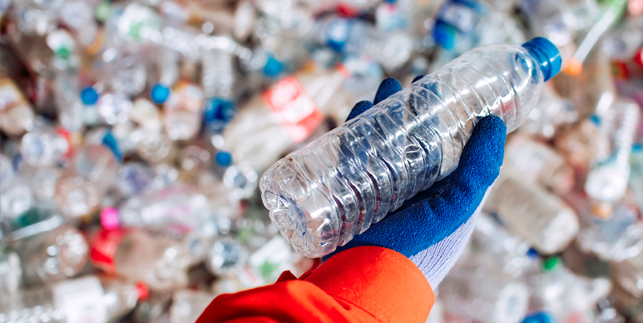Manufacturers Need New Solutions to Comply With California’s Latest Plastic Recycling Laws

Plastics manufacturers are facing increasing regulation around the world, and some of the most impactful regulations yet are coming into effect in California. A pair of California state bills introducing new recycled content and product labeling requirements, along with increased responsibility for manufacturers concerning the lifecycle of their products.
Many plastics manufacturers face significant challenges not only in meeting these requirements in production but also in demonstrating compliance. With the onus on manufacturers to show that they’re meeting new standards, new solutions are needed to enforce policies on the shop floor and to collect and manage production data concerning recycled content.
The Plastic Pollution Prevention and Packaging Producer Responsibility Act
California’s Governor Newsom signed SB 54, the Plastic Pollution Prevention and Packaging Responsibility Act, into law on June 30th, 2022. The act seeks to shift responsibility for product lifecycles onto manufacturers in an attempt to increase recycling adoption and reduce plastic waste.
The act covers a broad range of single-use packaging and other products. While not strictly limited to plastics, many of the covered categories will directly impact plastics manufacturers. In addition to single-use packaging, single-use service ware, including straws, utensils, plates, and wrappers that are either plastic or plastic-coated, are also included.
Department of Resources, Recycling, and Recovery Regulations
The act introduces a variety of regulations to be administrated through the Department of Resources Recycling and Recovery regulations concerning the production and recycling of materials covered under the act.
Source reduction is one of the primary targets of the regulations, requiring a total 25% weight and 25% plastic component reduction for materials by 2032. Manufacturers and suppliers are required to achieve this reduction through shifts to reusable packaging, bulk packaging, and other methods.
By 2023, all covered materials sold, distributed, or imported in California must meet standards as either recyclable within the state or compostable. These changes will require suppliers to choose manufacturers with the appropriate design and formulation to meet these standards, and many manufacturers will have to change their production to meet those standards.
The responsibility for consumer recycling is now being shifted onto manufacturers and suppliers as well. A progressive schedule has been established that will require 30% recycling by 2028, 40% by 2030, and 65% by 2032.
Producer Responsibility Organizations
The act also establishes the requirement for producers to form and join producer responsibility organizations (PROs). These non-profit organizations are to be established by the industry and act on behalf of their members to establish and enforce compliance with standards set by the Department of Resources, Recycling, and Recovery.
It is through these PROs that manufacturers and suppliers will report compliance. The PROs will develop producer responsibility plans that address requirements for reduction and recycling. Participating in a PRO will require a producer to pay fees, and failure to participate in a PRO will prohibit the producer from selling, importing, or distributing covered materials in California.
The fees will go to the California Plastic Pollution Mitigation Fund. 40% will go to state agencies for monitoring and reducing environmental impact, and 60% will go to the Strategic Growth Council, the California Environmental Protection Agency, and the Natural Resources Agency.
The Department of Resources, Recycling, and Recovery Regulations can impose civil administrative penalties for any organization that fails to abide by the act. These penalties can reach up to $50,000 per day per violation.
Truth in Labeling for Recyclable Materials
A separate bill, SB 343, seeks to enforce transparency in recycling content use among plastics manufacturers. The Truth in Labeling for Recyclable Materials prohibits deceptive or misleading claims about recycled content or recyclability of products and packaging, including the use of common symbols such as the familiar “chasing arrows.”
The Department of Resources Recycling and Recovery is set to provide guidelines for determining whether a product is recyclable or not. These guidelines will be made available on January 1st, 2024, and manufacturers will have up to 18th months to bring their operations into compliance.
Much of the recyclability criteria to be implemented in the guidelines will depend on which materials routinely become feedstock through recycling programs. A study is currently underway to gauge what percentage of certain materials are recycled and how much of that recycled content is used in the production of new products.
Meeting recyclability standards will also mean avoiding any components or additives that prevent recycling in the state. Manufacturers will have to be able to demonstrate the formulation of their products to ensure that none of these compounds are used in manufacturing.
Manufacturers using materials that don’t fall under the specific materials listed by the Department of Resources Recycling and Recovery will also have recourse. They can submit a proposal detailing how their products are collected, sorted, and recycled, providing a route for overlooked materials to still be labeled as recyclable.
How Manufacturers Can Meet Changing Regulations
These are just two examples of how plastics manufacturing regulation is changing. New regulations are being put in place domestically and abroad that will impact the way that plastics manufacturers manage their shop floors.
Matics Real-time Operational Intelligence (RtOI) is a solution that lets manufacturers face the challenges that come with new regulations. When it’s necessary to change recipes and recycled content to meet new standards, RtOI provides recipe management and real-time monitoring to ensure that planned changes are enforced on the shop floor.
Continuous data aggregation through a consolidated platform makes it easy to demonstrate compliance with recycled material content regulations. Individual batches and production runs will have complete and accessible records, allowing manufacturers to demonstrate recycled content use.
As regulators shift more of the responsibility for recycling and other aspects of sustainability onto manufacturers, transparency and accuracy in production data have never been more important. RtOI streamlines the aggregation, analysis, and management of production data for any shop floor.
Tackle Sustainability, Productivity, and Profitability With Matics
Matics RtOI is a major asset for enforcement and transparency with regard to new regulations. It’s also a powerful tool for improving productivity and profitability in your manufacturing operations. Real-time monitoring, work management tools, and more features serve sustainability and productivity at the same time on your shop floor. See how Matics can take your manufacturing operations to new heights.





